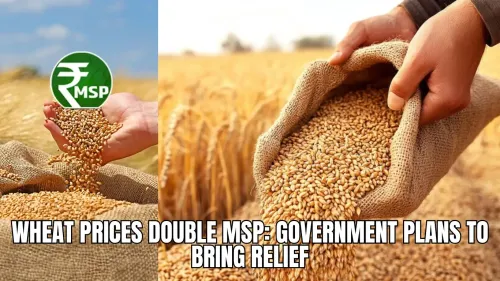Wheat Prices Double MSP: Government Plans to Bring Relief

0 Views
Updated On:
Wheat prices doubled MSP in November, prompting the government to release stocks through auctions to control rising costs.

Key Highlights
- Wheat prices doubled MSP, reaching ₹5,800 per quintal in November.
- Government to release 25 lakh metric tonnes via e-auctions.
- Reserve price set at ₹2,300–₹2,325 per quintal for sales.
- Current FCI wheat stock: 222.64 lakh metric tonnes.
- Prices vary across states, peaking at ₹6,000 per quintal in Maharashtra.
The price of wheat has surged significantly, causing concerns among the public and the government. In November 2024, wheat prices in the open market doubled the minimum support price (MSP) set by the government. To control this sharp rise, the government is implementing measures to stabilize prices and provide relief to consumers.
Also Read: Farmers Can Get High-Yield Wheat Seeds at 50% Subsidy: 11 Top Varieties for High Yields, Here's How
Wheat Prices Surge in November
Throughout November, wheat prices steadily increased across various states. On November 20, 2024, the highest wholesale price in Delhi, Uttar Pradesh, Gujarat, and Goa reached ₹5,800 per quintal—more than double the MSP of ₹2,275 per quintal.
- Delhi: Average price ₹3,100 per quintal.
- Uttar Pradesh: ₹2,867 per quintal on average.
- Gujarat: ₹3,514 per quintal.
- Maharashtra: ₹3,974 per quintal, with a peak of ₹6,000 per quintal in Mumbai.
- Goa: The highest price recorded was ₹5,000 per quintal.
The government had recently increased the MSP for wheat to ₹2,425 per quintal for the upcoming 2025–26 season to support farmers.
Government’s Plan to Tackle Price Hike
To stabilize wheat prices, the Food Corporation of India (FCI) plans to release 25 lakh metric tonnes of wheat into the open market through e-auctions under the Open Market Sale Scheme (OMSS).
- Wheat will be sold to flour mills, processing units, and manufacturers at a reserve price of ₹2,300–₹2,325 per quintal.
- This move aims to boost supply and curb the rising prices.
Wheat Buffer Stock and Availability
As of October 31, 2024, FCI has 222.64 lakh metric tonnes of wheat in its buffer stock, exceeding the required standard of 205.20 lakh metric tonnes. After releasing 25 lakh metric tonnes, over 197 lakh metric tonnes will still remain in storage.
Current Wheat Prices Across Major States
Here is a snapshot of wheat prices in key states as of November 2024:
State | Average Price (₹/quintal) | Highest Price (₹/quintal) |
Maharashtra | 2,897.2 | 6,000 |
Gujarat | 2,884.5 | 3,260 |
Uttar Pradesh | 2,747.51 | 2,950 |
Rajasthan | 2,745.75 | 2,830 |
Madhya Pradesh | 2,720 | 2,740 |
Delhi | 2,987.5 | 3,100 |
Bihar | 2,900 | 3,000 |
Karnataka | 3,533.33 | 4,200 |
West Bengal | 2,600 | 3,300 |
Impact on Consumers and Farmers
The rising wheat prices are a double-edged sword. While higher prices benefit farmers, they increase the burden on consumers due to costlier wheat-based products. The government’s intervention aims to strike a balance between supporting farmers and protecting consumers.
Also Read: New Sugarcane Variety KO.Lakh.16202: A Boon for Farmers with Bumper Yields
CMV360 Says
The government’s decision to release wheat stocks and regulate prices through the OMSS is a critical step in addressing inflationary pressures. The impact of these measures on the market will determine whether the prices stabilize and bring relief to consumers.
